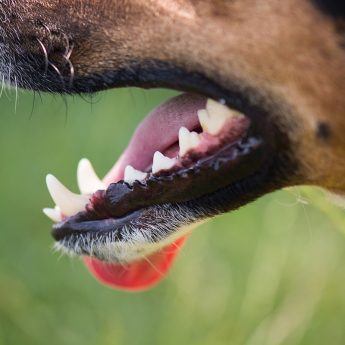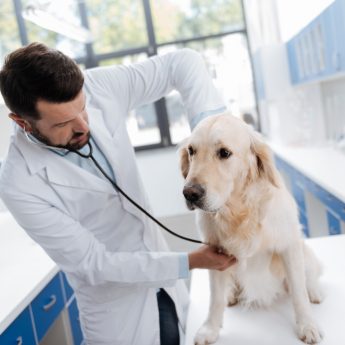Despite our many differences, we share a number of biological similarities with our dogs.
They are compelled by several the same desires, feel many of the same drives and, tragically, suffer many of the same health problems that humans do.
This was made world-shatteringly clear for me about 7 years ago, when my vet diagnosed my beloved and now-passed lab mix with breast cancer (I still miss you, Mocha). He called it mammary cancer, but it’s the same thing.
Breast cancer is just as significant a health concern for our dogs as it is for most women; in fact, it is part of the reason spaying is so fervently recommended by most vets.
While my experiences reflect one of the darker examples of these similarities, many shared health problems are of a less tragic, if more annoying, nature.
Take, for example, allergies.
Dogs can and do suffer from allergies, and they depend upon their owners to help ease their symptoms – no matter what caused them. Unfortunately, sometimes the culprit of a dog’s allergies can be their feline housemate. That’s right, dogs can be allergic to cats!
Dogs sneezing may be adorable, but it gets pretty annoying for them after a while, and any owners with their own allergies know how terrible they can be.
Still, before going further, let’s make sure I make amends for that depressing story. Here are 2 minutes and 46 seconds of dogs sneezing. It’s both topical and hilariously heart-warming.
What Are Allergies, Anyway?
Allergies are not the sole domain of humans – our dogs can also suffer the itching, sniffling, and watery eyes that accompany allergic reactions.
As it turns out, dogs can be allergic to many of the same things we are. Pollen, dust and food are common culprits, and in a particularly cruel twist of fate, some dogs are even allergic to their people.
We’ve discussed allergies before, although we normally concentrate on the human-side of the equation. However, the general principle at work is the same for dogs as it is for their owners. Allergies occur when the body’s immune system overreacts to a perceived threat – known as an allergen.
Accordingly, while there is nothing dangerous about dog or cat dander, the body reacts as if it is toxic.
Can Dogs Be Allergic to Cats? You Betcha

To answer our initial inquiry, the answer is a clear yes.
Dogs can and often do suffer from cat allergies. In such cases, they are typically reacting to the same things that lead to cat allergies in people – dander and saliva.
The symptoms of a cat allergy can resemble those elicited by any other type of allergy. So, you’ll want to consult your veterinarian if your dog exhibits any of the following signs or symptoms:
- Red, itchy skin
- Constant licking, especially if the licking takes place over a large area
- Coat discoloration or hair loss
- Unusual odors associated with your pet, which often accompany secondary infections caused by allergies
- Rubbing his face on the carpet or other rough surfaces
- Ear discomfort
It is important to note that dogs with allergies are usually allergic to more than one thing.
So, even if your dog is allergic to cats and you prevent your pooch from having any contact with his feline housemates, he may still exhibit symptoms caused by other allergic triggers.
Once again, this highlights the need to work closely with your vet to help get your dog’s symptoms under control.
Veterinary Assistance For Assessing Allergies
See your veterinarian if you are worried that your pooch may be suffering from allergies to cats (or anything else, for that matter). He or she will likely verify that the symptoms are consistent with allergies, and not, for example, fleas, ticks, lice, other insect bites, ringworm, respiratory infections, or other afflictions that may mimic allergies.

After verifying that your pet is suffering from allergies, your vet (or a specialist to whom your vet refers you) will likely want to establish the cause of the allergies. He or she will want to find out whether the affliction is being caused by cat dander, pollen, or any number of other possible causes.
To do so, your vet (or the specialist) will investigate the problem in the same way a human allergy specialist would.
Using a small needle, the vet will insert a small quantity of a common allergen (such as cat dander) into your dog’s skin. The vet will then repeat this process with several other common allergens and a sterile control needle.
A short while later, the vet will have you bring your pet back into the office, where he or she will re-examine the area. Most of the needle pricks will not exhibit any inflammation or redness, and will be well on their way to healing, if they haven’t done so already.
By contrast, the needle pricks that contained substances to which your dog is allergic, will often be red, inflamed and require more time to heal than those needles tinged with substances that do not elicit an allergic reaction.
Blood tests are also available to help identify your dog’s allergens. However, these tests are rarely as accurate as intradermal (needle-prick) tests are.
Treating Your Dog’s Feline Allergy
While it certainly isn’t ideal to discover that your dog is allergic to your cat, it isn’t a terribly difficult condition to treat. Most often, vets carry out procedures designed to “reset” your pet’s immune system, just as human allergy specialists do for their patients.
This can often be accomplished by exposing the dog to small quantities of the allergen. This often takes the form of an oral medication or a series of injections. With luck, your dog’s immune system will learn to play nicely and start to ignore the causative agent.
Additionally, if your dog appears to be exceptionally allergic to cats (or anything else), it may be wise to ask your veterinarian if you should keep an emergency Epi-Pen on hand. Very few dog allergies are significant enough to rise to lethal levels, but it is always better to be safe than sorry where your pet is concerned!
Other Safe and Easy, At-Home Solutions For Curbing Your Dog’s Kitty Allergies
Aside from sensitivity treatments, you can take a number of other steps to help ease your dog’s suffering. Many such treatments are inexpensive, although they can require a good deal of labor.
- Vacuum your home regularly, including all carpets, drapes, and other fabric-covered items. Use a vacuum designed specifically to collect pet hair – preferably one that includes a HEPA filter to remove the most allergens possible.
- Bathe your dog regularly (and cat, to the extent possible) to help remove the allergens present on his skin before they can cause irritation.
- Consider purchasing a pet-focused air purifier capable of removing allergen-sized particles from the air in your home.
- Clean hard floors with a wet-wipe-style cleaner or broom designed to collect pet hair to remove dander and fur from these substances before they can float into the air or coat your dog.
- Consider separating your cat and dog, by restricting them to different portions of the house with the help of an indoor pet gate or even a repurposed baby gate! If this is not desirable or possible, try to move allergen-coated items (such as climbing toys and perches) away from areas your dog frequents.
- Provide your dog with omega-3 supplements. Omega-3 fatty acids not only reduce inflammation in a safe, natural manner, but they also help support skin health and the skin’s natural defenses.
***
Do you have a pooch who is allergic to cat dander? What steps have you taken to ease his suffering? Let us know what has worked and (just as importantly) what hasn’t worked in the comments below.









1 Comment
April 1, 2019
Can watery eyes and discharge be allergies?